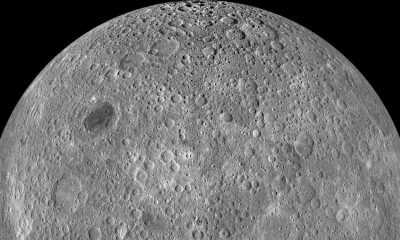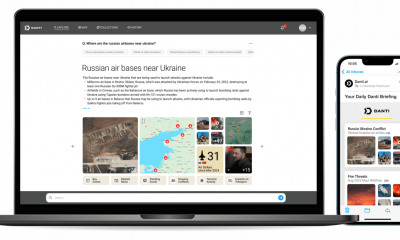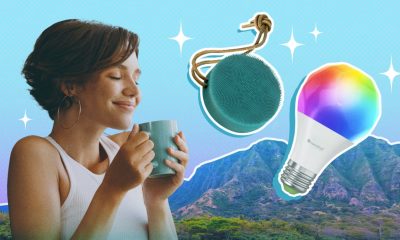Entertainment
7 greatest filter water bottles for travel in 2023

UPDATE: Aug. 3, 2023, 5:00 a.m. EDT This guide has been updated with new information from experts as well as our latest product recommendations.
From road trips and backcountry camping to jet-setting across the globe, there are a few things that every traveler should have — and that includes access to clean water.
Buying overpriced water bottles is an option, of course, but who wants to throw away that kind of money and contribute to plastic waste in this day and age? And sure, you could just drink from the tap, but in many places that means risking foul, weird-tasting water — or worse, violent stomach illness.
But there’s a much better solution: reusable water bottles that come with their own built-in filtration system so you can have cool, clean sips wherever your travels take you. In fact, the greatest filter water bottles are a must-have when traveling to destinations that lack plentiful clean water, whether that’s a far-away country or a wilderness camping trip in the next county over.
Once you have a filter water bottle for travel, you might even start using it for everyday use at home or in the office. Even when traveling within the United States, you can use these travel water bottles in hotels, as they make water taste extra-clean and fresh.
But how do these reusable bottles actually work? And what are the greatest filtered water bottles for travel? We consulted the hydration experts to find out.
What do water bottle filters remove?
Filtered water bottles are capable of removing lots of gross stuff from tap water and freshwater sources (think rivers, lakes, springs, etc.), but they’re not all made the same. As Chip Kilduff, associate professor of civil and environmental engineering at Rensselaer Polytechnic Institute points out, it really depends on the types of water filters a manufacturer uses. The most common water filters for travel include activated carbon filters and membrane microfilters; some bottles have both while others only utilize one.
Generally speaking, a quality water filtration bottle should remove several contaminants from the water. According to Dr. Kelvin Fernandez, a physician and healthcare educator at Ace Med Boards, these include particulates like sand and silt, as well as harmful elements like bacteria, viruses, and certain chemicals. The vast majority of contaminants can be removed with a membrane microfilter, but you may also want an activated carbon filter to remove things like chlorine, volatile organic compounds, heavy metals, pesticides and any weird flavors or odors.
Do water filter bottles remove bacteria?
The greatest filtered water bottle can remove bacteria from tap and freshwater sources, but it all depends on the size of the pores in the filters used.
“The filters are rated by the size of particles that they allow to pass,” says Jason Hitchcock, an expert survivalist and avid outdoorsman with a background in engineering, who is also the founder of the emergency preparedness website Survival Stoic. “For example, a 0.1 micron water filter will allow anything that is smaller than 0.1 microns to pass through the filter.”
For reference, protozoa are typically around 5 to 15 microns in size and bacteria are typically 0.2 to 10 microns in size.
Kilduff goes on to explain that the membrane microfilters commonly used in filter water bottles for travel have a pore size ranging from 0.2 micron to about 10 micron. He confirms that this is sufficient to remove particles, protozoans and bacteria with high efficiency.
Additionally, the U.S. Centers for Disease Control and Prevention has guidance for campers worried about common parasites and bacteria like giardia. If you’re searching for the greatest filter water bottles for hiking and you’re worried about giardia, look for filters with labels that include phrases such as:
-
Reverse osmosis
-
Absolute pore size of 1 micron or smaller (this is not the same as “nominal pore size of 1 micron”)
-
Tested and certified to NSF/ANSI Standard 53
-
Tested and certified to NSF/ANSI Standard 58 for cyst removal
Do water filters remove viruses?
Bacteria removal is definitely more likely than virus removal, Kilduff says, but a water filter could provide some protection if it can filter 0.1 microns or smaller.
“Some of the greatest filters will filter down to 0.1 microns,” Hitchcock points out from his extensive research and personal experience with the top-rated water filtration bottles on the market today. “[But] viruses can be between 0.0004 and 0.1 microns in size… so some viruses may be allowed to pass.”
That said, most viruses do not survive in drinking water. However, if you are in an area with a heavy virus outbreak, Hitchcock recommends boiling your water to be safe. Learn more in Mashable’s guide to water filters.
What should you filter out of tap water?
Just because a water filter can filter out a long list of impurities doesn’t necessarily mean that’s the filtered water bottle that you need for your travels; it really depends on where you’re headed.
“In a city, a basic filter that removes particulates and chlorine might be sufficient,” says Dr. Fernandez. “But for wilderness camping or traveling in certain countries, you might want a more advanced filter that can handle bacteria, viruses and possibly chemicals.”
What’s the difference between a water filter and a water purifier?
It’s important to note that water filtration and water purification are not the same, but they do go hand-in-hand to create the cleanest water possible.
Filtration can remove the stuff you can see in water (and lots that you can’t), such as sediment, microplastics, bacteria, parasites and more. Purifiers, however, remove impurities — such as viruses — that may be too small to be caught and removed by a filter. Water purifiers also kill other microbes, pathogens and bacteria in water — but they can’t get rid of those larger particles like silt and sediment.
“Disinfection — or the inactivation of bacteria, protozoa and viruses — can be done using chemicals like chlorine or iodine, or using UV light (for example, the Steripen from Katadyn),” says Kilduff. “Combined with filtration, this can provide additional protection.”
With all of this information in mind, we had wanted to gather the greatest filtered water bottles for travel, for hiking, and for everyday use. Keep reading to find the greatest water filter bottles for you.
-

 Entertainment6 days ago
Entertainment6 days agoWhat’s on the far side of the moon? Not darkness.
-

 Business7 days ago
Business7 days agoHow Rubrik’s IPO paid off big for Greylock VC Asheem Chandna
-

 Business6 days ago
Business6 days agoTikTok faces a ban in the US, Tesla profits drop and healthcare data leaks
-

 Business5 days ago
Business5 days agoLondon’s first defense tech hackathon brings Ukraine war closer to the city’s startups
-

 Business7 days ago
Business7 days agoPhoto-sharing community EyeEm will license users’ photos to train AI if they don’t delete them
-

 Entertainment6 days ago
Entertainment6 days agoHow to watch ‘The Idea of You’: Release date, streaming deals
-

 Entertainment5 days ago
Entertainment5 days agoMark Zuckerberg has found a new sense of style. Why?
-

 Business5 days ago
Business5 days agoHumanoid robots are learning to fall well




























